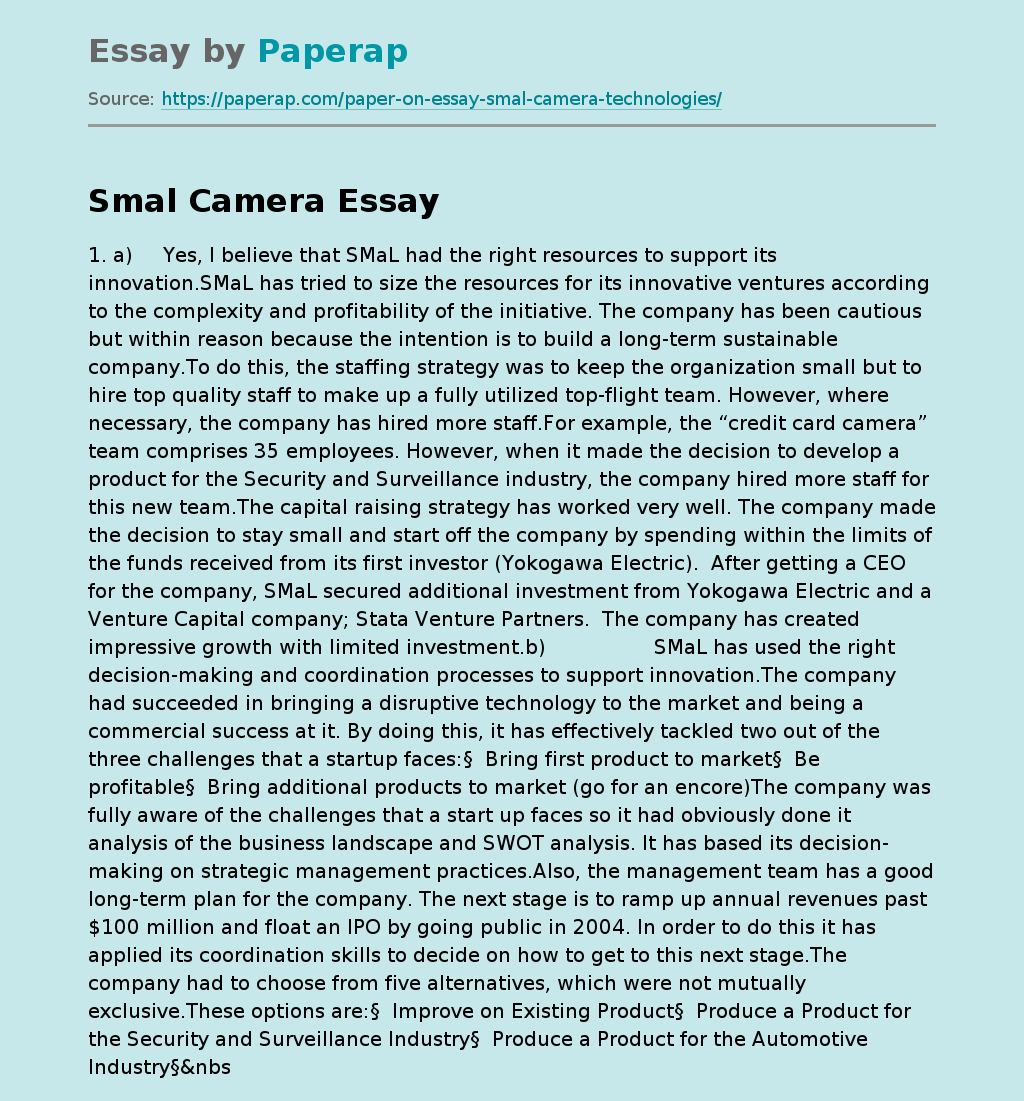New Small Innovative Team
Yes, I believe that small had the right resources to support its innovation. small has tried to size the resources for its innovative ventures according to the complexity and profitability of the initiative. The company has been cautious but within reason because the intention is to build a long-term sustainable company. To do this, the staffing strategy was to keep the organization small but to hire top quality staff to make up a fully utilized top-flight team. However, where necessary, the company has hired more staff.
For example, the “credit card camera” team comprises 35 employees. However, when it made the decision to develop a product for the Security and Surveillance industry, the company hired more staff for this new team. The capital raising strategy has worked very well. The company made the decision to stay small and start off the company by spending within the limits of the funds received from its first investor (Yokogawa Electric). After getting a CEO for the company, SMaL secured additional investment from Yokogawa Electric and a Venture Capital company; Stata Venture Partners.
The company has created impressive growth with limited investment.
SMaL has used the right decision-making and coordination processes to support innovation. The company had succeeded in bringing a disruptive technology to the market and being a commercial success at it. By doing this, it has effectively tackled two out of the three challenges that a startup faces:§ Bring first product to market§ Be profitable§ Bring additional products to market (go for an encore)The company was fully aware of the challenges that a start-up faces so it had obviously done it analysis of the business landscape and SWOT analysis.
It has based its decision-making on strategic management practices. Also, the management team has a good long-term plan for the company. The next stage is to ramp up annual revenues past $100 million and float an IPO by going public in 2004. In order to do this it has applied its coordination skills to decide on how to get to this next stage. The company had to choose from five alternatives, which were not mutually exclusive. These options are:§ Improve on Existing Product§ Produce a Product for the Security and Surveillance Industry§ Produce a Product for the Automotive Industry§ Produce a Product for the Phone Industry§ Create another Innovative Imaging ProductThe pros and cons of these alternatives have been reviewed using good decision making processes of reviewing cost and benefit (Cost-Benefit Analysis).
The company has clearly defined values relating to risk, conditions that determine whether to start work on an innovation or to continue working on an innovation.These values are reflected in their go-to-market, financing and business model approach. This approach also helps in defining its prospective markets according to the BCG Product/Services Matrix. The company ensures that it has a healthy mix of revenue. That is why it has chosen its target markets as consumer cameras, security and surveillance, and automotive industries. The credit camera product is the company’s “cash cow” (mature business). The automotive products are the “stars” (good investment opportunities). They provide the best long term bet for the company but may not yield significant revenue until 2005. The company is allocating resources to fund the security and surveillance products (the “question marks” and likely future stars). These are products/services that are untested in the market but appear to have strong growth potential). The security and surveillance market is a conservative market but it has the potential to produce another disruptive technology.
New Small Innovative Team. (2019, Dec 05). Retrieved from https://paperap.com/paper-on-essay-smal-camera-technologies/

